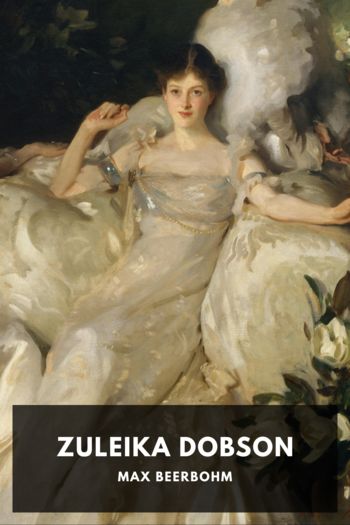The Works of Max Beerbohm, Max Beerbohm [epub read online books .txt] 📗

- Author: Max Beerbohm
Book online «The Works of Max Beerbohm, Max Beerbohm [epub read online books .txt] 📗». Author Max Beerbohm
This was the kind of life that young George found opened to him, when, at length, in his nineteenth year, they gave him an establishment in Buckingham House. How his young eyes must have sparkled, and with what glad gasps must he have taken the air of freedom into his lungs! Rumour had long been busy with the damned surveillance under which his childhood had been passed. A paper of the time says significantly that “the Prince of Wales, with a spirit which does him honour, has three times requested a change in that system.” King George had long postponed permission for his son to appear at any balls, and the year before had only given it, lest he should offend the Spanish Minister, who begged it as a personal favour. I know few pictures more pathetic than that of George, then an overgrown boy of fourteen, tearing the childish frill from around his neck and crying to one of the Royal servants, “See how they treat me!” Childhood has always seemed to me the tragic period of life. To be subject to the most odious espionage at the one age when you never dream of doing wrong, to be deceived by your parents, thwarted of your smallest wish, oppressed by the terrors of manhood and of the world to come, and to believe, as you are told, that childhood is the only happiness known; all this is quite terrible. And all Royal children, of whom I have read, particularly George, seem to have passed through greater trials in childhood than do the children of any other class. Mr. Fitzgerald, hazarding for once an opinion, thinks that “the stupid, odious, German, sergeant-system of discipline that had been so rigorously applied was, in fact, responsible for the blemishes of the young Prince’s character.” Even Thackeray, in his essay upon George III, asks what wonder that the son, finding himself free at last, should have plunged, without looking, into the vortex of dissipation. In Torrens’ Life of Lord Melbourne we learn that Lord Essex, riding one day with the King, met the young Prince wearing a wig, and that the culprit, being sternly reprimanded by his father, replied that he had “been ordered by his doctor to wear a wig, for he was subject to cold.” Whereupon the King, to vent the aversion he already felt for his son, or, it may have been, glorying in the satisfactory result of his discipline, turned to Lord Essex and remarked, “A lie is ever ready when it is wanted.” George never lost this early-ingrained habit of lies. It is to George’s childish fear of his guardians that we must trace that extraordinary power of bamboozling his courtiers, his ministry, and his mistresses that distinguished him through his long life. It is characteristic of the man that he should himself have bitterly deplored his own untruthfulness. When, in after years, he was consulting Lady Spencer upon the choice of a governess for his child, he made this remarkable speech, “Above all, she must be taught the truth. You know that I don’t speak the truth and my brothers don’t, and I find it a great defect, from which I would have my daughter free. We have been brought up badly, the Queen having taught us to equivocate.” You may laugh at the picture of the little chubby, curly-headed fellows learning to equivocate at their mother’s knee, but pray remember that the wisest master of ethics himself, in his theory of ἑξεις ἀποδείκτικαι, similarly raised virtues, such as telling the truth, to the level of regular accomplishments, and, before you judge poor George harshly in his entanglements of lying, think of the cruelly unwise education he had undergone.
However much we may deplore this exaggerated tyranny, by reason of its evil effect upon his moral nature, we cannot but feel glad that it existed, to afford a piquant contrast to the life awaiting him. Had he passed through the callow dissipations of Eton and Oxford, like other young men of his age, he would assuredly have lacked much of that splendid, pent vigour with which he rushed headlong into London life. He was so young and so handsome and so strong, that can we wonder if all the women fell at his feet? “The graces of his person,” says one whom he honoured by an intrigue, “the irresistible sweetness of his smile, the tenderness of his melodious, yet manly voice, will be remembered by me till every vision of this changing scene are forgotten. The polished and fascinating ingenuousness of his manners contributed not a little to enliven our promenade. He sang with exquisite taste, and the tones of his voice, breaking on the silence of the night, have often appeared to my entranced senses like more than mortal melody.” But besides his graces of person, he had a most delightful wit, he was a scholar who could bandy quotations with Fox or Sheridan, and, like the young men of today, he knew all about Art. He spoke French, Italian, and German perfectly. Crossdill had taught him the violoncello. At first, as was right for one of his age, he cared more for the pleasures of the table and of the ring, for cards and love. He was wont to go down to Ranelagh surrounded





Comments (0)